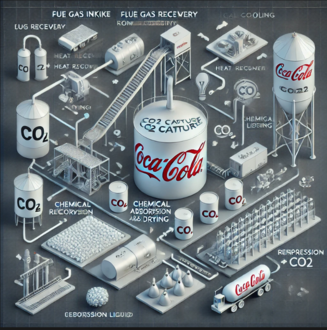Co2 Gas Project
The proposals in the documents focus on capturing and utilizing CO₂ emissions from natural gas (LNG) power plants and converting them into valuable products like food-grade CO₂, e-fuels, and green methanol.
Below is a summary of the key points and benefits for various sectors and industries:
1. CO₂ Capture for Food-Grade CO₂Process: Captures CO₂ from LNG power plant flue gases using advanced technologies like chemical adsorption and low-temperature fractionation.Benefits:Food industry: Utilized in carbonated beverages, refrigeration, food preservation, and grain storage.Environmental impact: Reduces CO₂ emissions by repurposing it for industrial processes.Economic value: Produces a high-demand product for global markets.
2. CO₂ Conversion to E-Fuels and Green MethanolProcess: Captures CO₂, generates green hydrogen, and synthesizes methanol and other synthetic fuels.Benefits:Energy industry: Replaces fossil fuels with renewable alternatives.Transportation sector: Fuels vehicles, reducing emissions and dependency on diesel and gasoline.Economic impact: Boosts Mexico’s GDP by 8% by converting CO₂ into high-value products, fostering exports and industrial development.Climate mitigation: Decreases global carbon footprint and contributes to Paris Agreement targets.
3. Technological Innovation and EfficiencyAdvancements: Reduces energy consumption in CO₂ capture and absorbent regeneration processes. Achieves higher CO₂ capture efficiency (>90%) with purity >99.9%.
Industry applications:Chemical and petrochemical processes.Agriculture: Enhances photosynthesis and crop yields in greenhouses.Industrial uses like welding, refrigeration, and supercritical extraction.Impact: Lowers operational costs and boosts competitiveness in international markets.
4. Economic Value GenerationInvestment: A typical project requires significant investment (around $40 million USD for a 560,000 tons/year CO₂ capture plant).Production: Green methanol and captured CO₂ generate revenues far exceeding investment costs, offering attractive margins for investors.Industrial ApplicationsChemical industry: Synthesis of products like dimethyl carbonate and biodegradable plastics.
Agriculture: Used as a gaseous fertilizer in greenhouses and for food preservation.Food industry: Production of carbonated beverages and other products requiring pure CO₂.Environmental ImpactEmission reduction: Decreases CO₂ emissions into the atmosphere, mitigating climate change.
Sustainability: Utilizes renewable sources to produce valuable products, aligning with circular economy strategies.In summary, these proposals have a direct impact on multiple sectors, including energy, transportation, agriculture, chemicals, and food, while significantly contributing to decarbonization and sustainable economic growth.
Questions Coca-Cola Might Ask the Provider to Assess the Feasibility of the Project:
Technical Viability:What is the guaranteed purity level of the captured CO₂, and does it meet our food-grade standards (e.g., 99.999%)?
Can the proposed solution scale efficiently to meet our global CO₂ requirements for beverage carbonation?
What are the maintenance and operational requirements for the proposed systems?
Sustainability Impact:How does the project contribute to Coca-Cola’s decarbonization goals and alignment with the Paris Agreement?
What is the expected reduction in CO₂ emissions compared to current sourcing methods?
Does the process support the use of renewable energy to further minimize the carbon footprint?
Economic Feasibility:What are the projected cost savings or economic benefits of adopting this solution versus traditional CO₂ procurement methods?
What is the anticipated ROI, and what are the associated risks?
Implementation and Supply Chain:What is the estimated timeline for deployment and integration into our supply chain?
Are there geographic limitations or logistical challenges for CO₂ production and delivery to our facilities?
Regulatory Compliance:Does the process comply with food safety regulations in all markets where Coca-Cola operates?What certifications or quality assurances can you provide?
Partnership Opportunities:Are there opportunities for Coca-Cola to collaborate in R&D or co-investment to enhance the scalability and efficiency of the technology?
We are pleased to present a transformative proposal for CO₂
capture technology that offers significant benefits across industries, with a direct and compelling value proposition for Coca-Cola.
This innovative solution not only aligns with your sustainability goals but also ensures a reliable and cost-effective supply of food-grade CO₂ to support your operations.
Key Benefits for Coca-ColaGuaranteed Food-Grade Purity:
The captured CO₂ meets stringent purity standards (≥99.999%), ensuring it is fully compliant with Coca-Cola's requirements for beverage carbonation.Sustainability Leadership:By adopting this technology, Coca-Cola can further its decarbonization agenda, contributing to the reduction of global CO₂ emissions and reinforcing its commitment to environmental stewardship.
Cost Efficiency and Supply Security:This solution provides a consistent and scalable source of CO₂, reducing dependency on traditional suppliers and mitigating risks related to market fluctuations.Brand Value Enhancement:Implementing such advanced, eco-friendly technology enhances Coca-Cola’s reputation as a sustainability pioneer, resonating with environmentally conscious consumers.
Proven Success CasesCase Study
1: Beverage Industry DeploymentA leading global beverage company integrated this CO₂ capture technology into its operations, achieving a 30% reduction in CO₂ procurement costs while significantly reducing their carbon footprint. The initiative also enabled them to meet regulatory requirements in key markets.Case Study
2: Multi-Industry AdoptionIn a collaborative project with food and chemical industries, the technology delivered over 560,000 tons/year of high-purity CO₂, contributing to an 8% GDP growth in the region by supporting new market opportunities in food-grade applications and green methanol production.
Request for GuidanceTo tailor our efforts effectively, we seek your insight on prioritizing sectors. Given Coca-Cola’s operational focus, should we direct our immediate efforts toward food-grade CO₂ supply or emphasize broader decarbonization initiatives?
If this aligns with your strategic vision, we kindly request confirmation to proceed.Additional InformationTo ensure this proposal meets your expectations,
we welcome the opportunity to address any specific questions or concerns. For instance:Are there particular geographic regions where Coca-Cola requires enhanced CO₂ supply security?
Would Coca-Cola consider partnering on a co-investment or pilot initiative to maximize impact?We look forward to your feedback and are committed to supporting Coca-Cola’s journey toward sustainability and operational excellence.

Click for ZOOM
Here is the diagram illustrating the CO₂ capture process tailored for Coca-Cola’s operations.
It outlines all key stages, from flue gas intake to food-grade CO₂ storage and distribution, ensuring clarity and alignment with your operational goals.
In order to follow up every single project please login below and let me know your comments, thanks